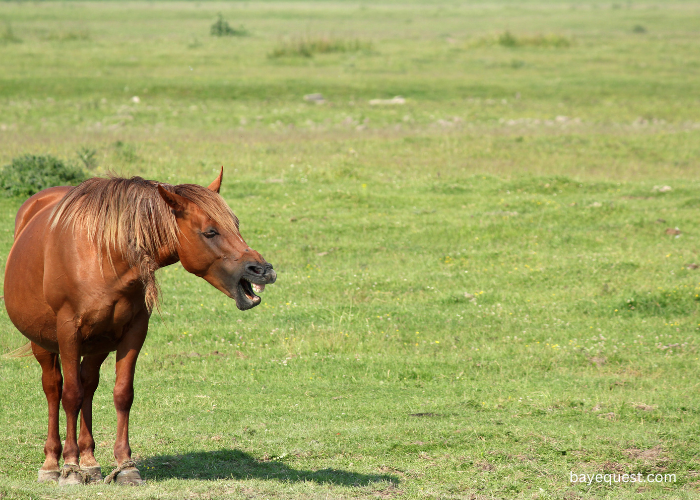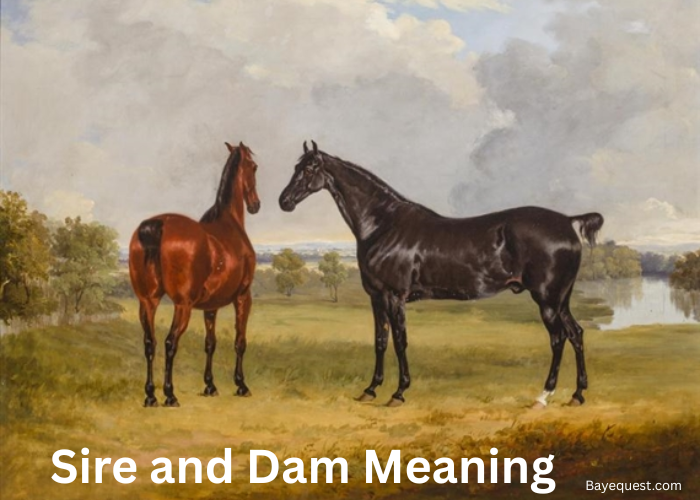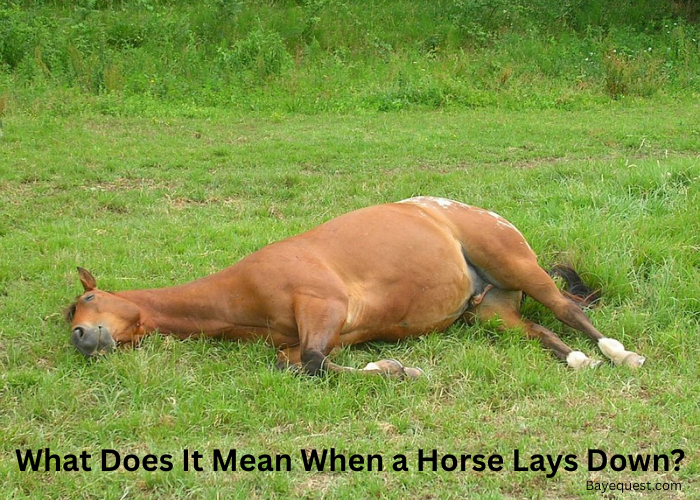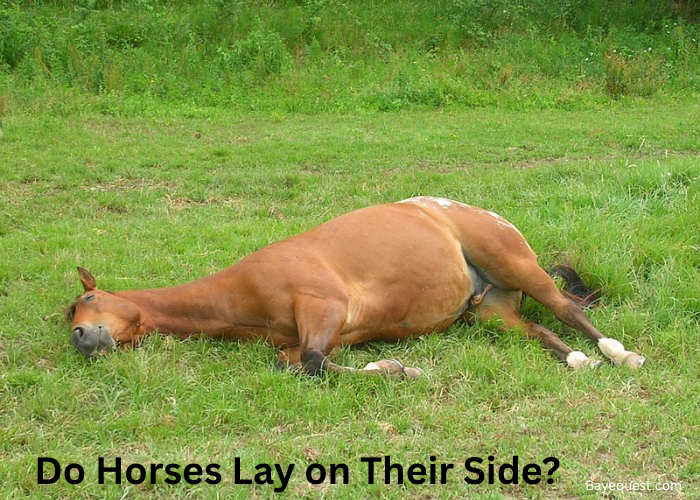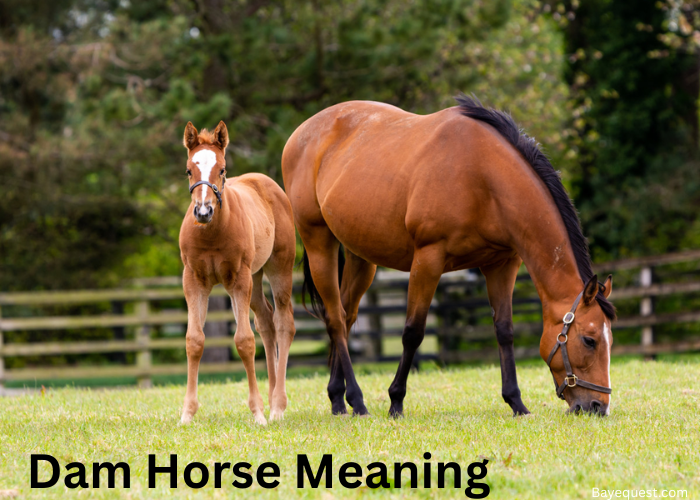Horses have their own language, and every sound tells a story. A whinny reaches out to a friend. A nicker whispers trust.
Each noise carries meaning, emotion, and intent.
These sounds are not just random. They help horses express excitement, fear, or comfort.
Learning their language brings us closer to them.
In this guide, we’ll explore the sounds horses make. We’ll break down whinnies, nickers, snorts, and more.
Understanding their voices helps us connect, communicate, and care for them better. Let’s dive into the world of horse sounds.
Horse Sounds in Words: Key Takeaway
- Blow
- Groan
- Grunt
- Neigh
- Bark
- Nicker
- Roar
- Scream
- Bray
- Sigh
- Snore
- Snort
- Squeal
- Whinny
- Whicker
Overview of Horse Sounds
Horses are social animals that use sounds to express themselves and communicate with those around them. Their vocalizations can tell us a lot about their feelings and intentions.
By understanding these sounds, we get a glimpse into their emotions—whether they’re excited, calm, or anxious.
Horses make a range of sounds, each with a specific purpose. From whinnies and nickers to snorts and squeals, each sound helps them connect with their environment.
Let’s explore these sounds in detail.
15 Types of Horse Sounds in Words
1. Blow
A blow is a sound horses make when they’re relaxed or when they’re taking in a new environment. It’s a reassuring, gentle sound, almost like a sigh.
When a horse blows, it’s often a sign that they’re at ease or calmly observing their surroundings.
2. Groan
A groan can be heard when a horse is exerting itself or just getting comfortable. You might catch this sound as a horse lies down or rises up.
It’s a deep, low sound that can express effort, mild discomfort, or even just a way of stretching.
3. Grunt
Horses grunt when they’re putting effort into something—a sudden jump or a physical push. It’s a short, forceful sound that tells you they’re working hard.
Grunting can also be a way for them to let you know they’re not entirely comfortable with a situation.

4. Neigh
The neigh is a classic sound, often used to call out to others. It’s full of expression, sometimes carrying excitement or longing.
This vocalization is a way for horses to make their presence known, especially when they want to reconnect with their companions.
5. Bark
Though rare, a horse’s bark is a sharp and quick sound. It happens when something unexpected catches their attention.
It’s almost like a warning that says, “Hey, what’s that?”—a sudden burst of noise that stands out.
6. Nicker
A nicker is one of the warmest sounds you’ll hear from a horse. It’s gentle, often heard when a horse is greeting someone they’re fond of or excited about feeding time.
There’s a soft, vibrating quality to it, almost as if the horse is murmuring their affection or happiness.
Interesting reading: Best Horse Songs.
7. Roar
A roar from a horse is quite rare and often signals intense emotion. It’s a loud, guttural sound, and while uncommon, it leaves a lasting impression if you hear it.
Typically, it’s a response to extreme frustration or pain—full of force and commanding attention.
8. Scream
A horse’s scream is a high-pitched, piercing noise, usually heard during a fight or when a horse feels threatened.
It’s a sound that’s hard to ignore, raw with emotion, and often linked to moments of conflict or extreme stress.
9. Bray
Though more typical of donkeys, horses may sometimes produce a bray-like noise, especially during intense emotional moments.
It’s a mixture of loud, uneven pitches, almost like they’re trying to shout something across. This sound carries a sense of urgency and intensity, reaching out across distances.
10. Sigh
Horses sigh in moments of relaxation. It’s a gentle exhale, a release of whatever they were holding in.
You might hear it after a long day’s work or as they settle into a comfortable spot. It’s a soft, calm sound that speaks of peace.
11. Snore
Just like us, horses can snore, especially when they’re lying down and completely at ease. It’s a rhythmic, nasal sound that’s usually faint and not very intrusive.
It shows that the horse is deep in rest, relaxed, and comfortable in their surroundings.
12. Snort
A snort is an unmistakable sound—sharp and forceful as the horse blows air through their nostrils. It can mean they’re alert, perhaps assessing a situation.
A snort can carry a lot of character, sometimes playful, other times expressing curiosity or mild annoyance.

13. Squeal
Horses squeal when they’re interacting socially, often when asserting themselves. It’s a high-pitched sound, sharp and quick, often heard during initial meetings or when setting boundaries.
It’s a sign that says, “Back off,” or simply expresses surprise or irritation.
14. Whinny
A whinny, much like a neigh, is one of the most recognizable horse sounds. It’s often a call for attention, a way to reach out across distance.
There’s a sense of yearning in it, whether it’s about locating a friend or greeting someone after being apart. It starts strong and fades out with emotion.
15. Whicker
The whicker is soft, like a nicker but with more breath. It’s often heard when a horse is curious or feeling affectionate.
It’s a warm sound, as if the horse is whispering, expressing calm interest or mild excitement without any urgency.
Read also: How Horses Show Affection.
How Does the Environment Affect Horse Sounds?
A horse’s environment plays a big role in how much and how often they vocalize.
In open fields with large herds, horses whinny more to stay connected. They call out to locate friends or signal a change in movement.
In quiet barns, they rely more on body language and soft nickers to communicate.
Horses in busy environments with new sights and sounds may snort more as they assess their surroundings.
Loud or unexpected noises can trigger alert calls, while familiar settings encourage calm vocalizations.
A relaxed horse in a peaceful place may sigh or nicker softly, showing trust and comfort. The presence of people also affects how they communicate.
Some horses nicker when they see their favorite human, while others may stay silent but use subtle cues like pinned ears, ear flicks, or soft snorts.
Horses adjust their sounds based on what’s happening around them, using their voices as a tool to connect, warn, or express emotions in response to their surroundings.
Fun Facts About Horse Sounds
1. Horses can recognize each other by sound alone. A familiar neigh or whinny can bring calm to a horse separated from its herd.
2. A mare will often nicker softly to her foal, and foals quickly learn to recognize their mother’s voice, building that special bond.
3. Horses use their ears and body language along with sounds to communicate more clearly. A snort might mean curiosity if the ears are perked, or irritation if they’re pinned back.
4. Different breeds sometimes have unique vocal habits. Arabian horses, for instance, are known to be quite expressive with their vocalizations.
Equine Vocalization: Conclusion
Horses speak to us in their own language, and each sound tells a story. From the gentle nicker to the sharp squeal, these noises help us understand what they feel and need.
Learning to listen is key—it helps us bond, know when they’re happy, or sense when they’re worried. The more we pay attention, the deeper our connection grows.
So next time your horse makes a sound, take a moment. Hear them out, because every whinny, blow, or snort is a part of their unique voice, waiting to be understood.




